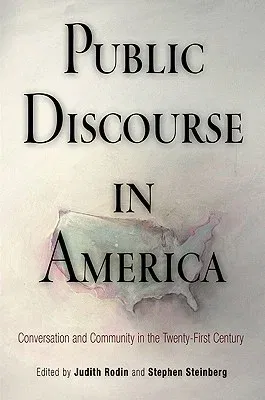A distinguished group of scholars and prominent figures here offers
thoughtful new perspectives on the tenor and conduct of public life in
contemporary America. Originating in a shared concern that our civic
culture was becoming coarser and more polarized, Public Discourse in
America provides a critical corrective to this widespread misperception
about declining civility in public culture and the ways we as citizens
negotiate our differences.
Together these essays explore the current condition and centrality of
public discourse in our democracy, investigating how it has changed
through our history and whether it fails to approach our widely held,
but often unarticulated, ideal of "reasoned and reasonable" public
deliberation. Contributors consider whether rationality is really the
best standard for public discussion and argument, and isolate the
features and principles that would characterize a truly exemplary, more
productive public discourse at the beginning of the twenty-first
century. They investigate why public conversations work when they work
well, and why they often fail when we need them the most, as in our
nation's so often aborted "national conversation" on race.
Taking a comprehensive look at institutional and leadership practices in
recent public debates over a variety of "hot button" public policy
issues, Public Discourse in America outlines how such conversations
can be used to reintegrate our fragmented communities and bridge
barriers of difference and hostility among communities and individuals.
These essays speak to urgent and perennial questions about the nature of
American society, the responsibilities of leaders, the rules of
democracy, and the role of public culture in times of crisis, conflict,
and rapid change. Public Discourse in America originated in the work
of the Penn National Commission on Society, Culture, and Community,
convened in 1996 by Judith Rodin, President of the University of
Pennsylvania. Distinguished members of the Commission, leading experts,
commissioned researchers, and leaders in America's nascent public
discourse movement offer unexpected insights and an optimistic vision of
the health of our politics and culture.
Readers--of all political persuasions--from the halls of political power
to the streets of urban neighborhoods, from newsrooms and studios to
think tanks and universities, will find these essays opening up new
paths to robust public discussion, more engaged citizenship, and
stronger communities.
Contributors include:
Joyce Appleby, Thomas Bender, Derek Bok, Alex Boraine, Graham G. Dodds,
Christopher Edley, Jr., Drew Gilpin Faust, Neal Gabler, Richard
Lapchick, Don M. Randel, Richard Rodriguez, Jay Rosen, David M. Ryfe,
Michael Schudson, Neil Smelser, and Robert H. Wiebe.

